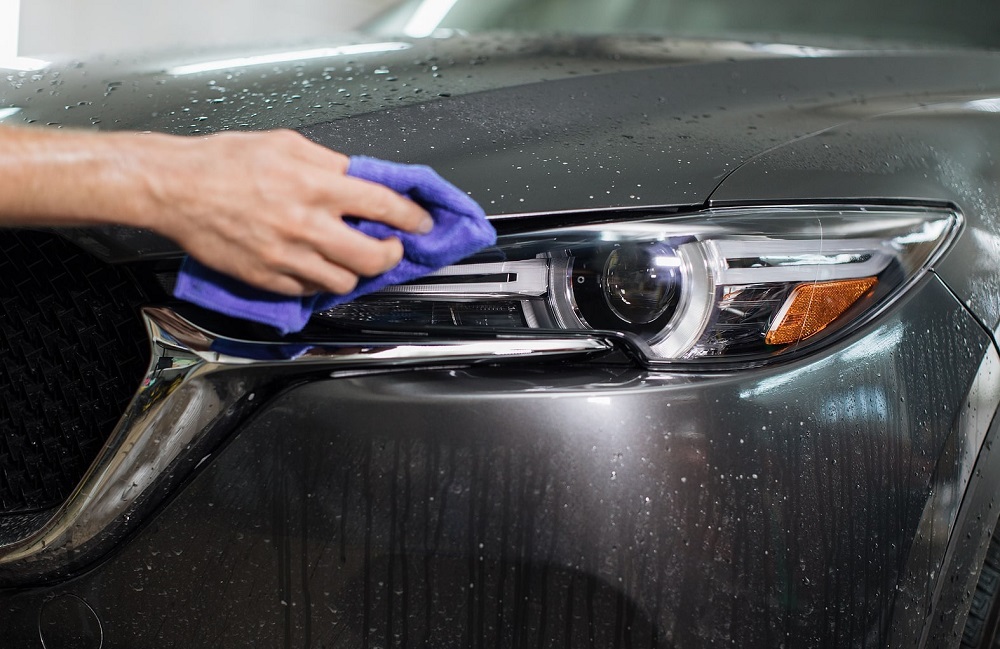The glossy allure of a well-maintained car is a source of pride for many owners. However, in the quest for the perfect shine, car care enthusiasts often encounter conflicting advice, especially when it comes to using household items like vinegar. In this comprehensive guide, we delve deep into the debated territory of whether vinegar poses a threat to your car’s paint. Let’s unravel the myth, explore the science, and equip you with the knowledge needed for optimal car care.
Table of Contents
- Understanding the Concerns
- The Impact on Car Paint
- Safe Ways to Use Vinegar in Car Care
- Alternatives to Vinegar
- Real-Life Experiences and DIY Solutions
- Expert Tips: Elevate Your Car Care Game with Vinegar
- 1. Dilution Precision: The Gold Standard
- 2. Spot Testing: Always a Smart Move
- 3. Gentle Application: Less is More
- 4. Quick Rinse: Don’t Let It Linger
- 5. Waxing Wisdom: A Protective Shield
- 6. Alternative Cleaning Agents: Explore Options
- 7. Seasonal Considerations: Adjusting Care
- 8. Professional Detailing: Periodic Treatments
- 9. Microfiber Magic: Optimal Cleaning Material
- 10. Mindful Storage: Shielding from the Elements
- FAQs: Navigating the Vinegar and Car Paint Conundrum
- 1. Is Vinegar Safe for Car Paint?
- 2. How Should I Dilute Vinegar for Car Cleaning?
- 3. Can Vinegar Remove Stubborn Stains on Car Paint?
- 4. Does Vinegar Damage Car Clear Coat?
- 5. Should I Conduct a Spot Test Before Using Vinegar?
- 6. Can I Use Vinegar to Remove Tree Sap or Tar from Car Paint?
- 7. Are There Safer Alternatives to Vinegar for Car Cleaning?
- 8. How Often Should I Wax My Car for Protection?
- 9. Can I Use Vinegar on a Newly Painted Car?
- 10. Does the Type of Vinegar Matter?
- Conclusion
- Final Tips for Car Enthusiasts
- Embrace Informed Car Care
Understanding the Concerns
1. The Vinegar Myth: Origins and Misconceptions
The notion that vinegar can harm car paint has roots in the acidic nature of this common household item. We explore the historical context of this myth and debunk common misconceptions that have perpetuated it over the years.
2. Components of Vinegar: A Chemical Breakdown
To truly understand vinegar’s potential impact, we dissect its chemical composition. Acetic acid, the primary component, is responsible for the acidity. However, it’s not a one-size-fits-all scenario, and understanding the nuances is crucial.
The Impact on Car Paint
3. Acidic Nature of Vinegar: Friend or Foe?
Acidity is often associated with paint damage, but how does vinegar fare in this aspect? We delve into the specifics of vinegar’s acidity levels and explore whether they genuinely pose a threat to your car’s exterior.
4. pH Levels Demystified: Balancing Act
The pH scale plays a vital role in determining the acidity or alkalinity of a substance. We demystify the science behind pH levels and discuss how maintaining the right balance is essential for preserving your car’s paint.
Safe Ways to Use Vinegar in Car Care
5. Dilution is Key: Finding the Right Mix
While vinegar is acidic, dilution can be the game-changer. Discover the importance of diluting vinegar and learn precise ratios for creating safe solutions tailored to different car care needs.
6. Application Techniques: Maximizing Benefits
Proper application techniques can minimize contact and maximize the benefits of using vinegar for specific purposes like removing stains or bird droppings. We share expert tips to ensure you apply vinegar safely.
Alternatives to Vinegar
7. Gentle Cleaning Agents: Exploring Options
Vinegar might not be the only solution. We explore alternative cleaning agents that are effective yet gentle on your car’s paint. From citrus-based cleaners to specialized car shampoos, find the right fit for your needs.
8. Waxing as a Protective Measure: Shielding Your Paint
Waxing goes beyond aesthetics; it acts as a protective barrier. We discuss how regular waxing can safeguard your car’s paint, adding an extra layer of defense against potential damage, including that from vinegar.
Real-Life Experiences and DIY Solutions
9. User Testimonials: Learning from Experiments
Real-life experiences offer valuable insights. Hear from car enthusiasts who have experimented with vinegar and gain practical tips on incorporating it into your car care routine.
10. DIY Car Care Recipes: From Cleaning to Restoration
Get hands-on with DIY car care recipes that go beyond vinegar. From homemade detailing sprays to paint restoration concoctions, discover cost-effective solutions for various automotive needs.
Expert Tips: Elevate Your Car Care Game with Vinegar
Car care is an art, and mastering it involves knowing the nuances of every product in your toolkit. When it comes to vinegar and your car’s paint, a few expert tips can make all the difference. Let’s explore ways to elevate your car care game and harness the power of vinegar responsibly. (See Also: Are Swirl Marks Inevitable? Tips to Prevent and Remove Them)
1. Dilution Precision: The Gold Standard
When using vinegar for cleaning or stain removal, precision in dilution is key. Different ratios work for various applications. Invest time in finding the perfect balance that ensures effectiveness without compromising your paint.
2. Spot Testing: Always a Smart Move
Before diving into extensive cleaning or detailing, conduct a spot test. Apply the diluted vinegar solution to a small, inconspicuous area to ensure compatibility with your car’s paint. It’s a simple step that can save you from potential headaches.
3. Gentle Application: Less is More
When applying vinegar, less is often more. Use a soft microfiber cloth or sponge to gently apply the solution. Avoid excessive scrubbing, which can lead to unnecessary friction and potential paint damage.
4. Quick Rinse: Don’t Let It Linger
After applying vinegar, prompt rinsing is crucial. Leaving the solution on the paint for extended periods can escalate the risk of damage. Swiftly rinse the treated area with water to neutralize the acidity.
5. Waxing Wisdom: A Protective Shield
Consider waxing your car regularly. Wax acts as a protective shield, adding an extra layer between your paint and potential contaminants. It enhances the glossy finish and minimizes the impact of acidic substances like vinegar.
6. Alternative Cleaning Agents: Explore Options
Vinegar is not the sole solution. Explore alternative cleaning agents that cater to your car’s specific needs. From pH-balanced car shampoos to eco-friendly citrus-based cleaners, diversify your cleaning arsenal.
7. Seasonal Considerations: Adjusting Care
Adapt your car care routine to seasonal changes. Winter salt, summer heat, and spring pollen each bring unique challenges. Tailor your cleaning approach to address seasonal concerns and protect your paint year-round.
8. Professional Detailing: Periodic Treatments
Consider professional detailing periodically. Detailers possess the expertise and tools to provide a deep clean, polish, and protective treatments that extend beyond your regular maintenance routine.
9. Microfiber Magic: Optimal Cleaning Material
Choose microfiber materials for cleaning and drying. Microfiber is gentle on your car’s paint, minimizing the risk of scratches. It’s an essential tool in your car care arsenal.
10. Mindful Storage: Shielding from the Elements
When not in use, consider covering your car. A car cover shields your vehicle from the elements, preventing unnecessary exposure to sunlight, bird droppings, and other potential hazards. (See Also: How Much to Wrap a Jeep Renegade: Cost Guide and Expert Tips)
Remember, expert car care involves a holistic approach. Incorporating these tips into your routine ensures that vinegar becomes a valuable asset rather than a potential threat to your car’s paint.
Curiosity often accompanies concerns about unconventional car care methods, and the use of vinegar on car paint is no exception. Let’s address some frequently asked questions to shed light on this topic and empower you with the knowledge needed for confident car care decisions.
1. Is Vinegar Safe for Car Paint?
Certainly, when used responsibly. Vinegar’s acidity can be a concern, but with proper dilution and application techniques, it can be a safe and effective cleaning agent.
2. How Should I Dilute Vinegar for Car Cleaning?
The ideal ratio varies, but a common guideline is mixing one part vinegar to ten parts water. Adjust the concentration based on your specific cleaning needs, always erring on the side of caution.
3. Can Vinegar Remove Stubborn Stains on Car Paint?
Yes, vinegar can effectively tackle stains like bird droppings or water spots. Apply the diluted solution gently, let it sit briefly, and then rinse thoroughly.
4. Does Vinegar Damage Car Clear Coat?
When used in moderation and with proper dilution, vinegar is unlikely to damage the clear coat. However, prolonged exposure or excessive use may pose risks.
5. Should I Conduct a Spot Test Before Using Vinegar?
Absolutely. Conduct a small spot test on an inconspicuous area to ensure compatibility with your car’s paint. It’s a simple precaution that can prevent potential issues.
6. Can I Use Vinegar to Remove Tree Sap or Tar from Car Paint?
Yes, vinegar can help loosen tree sap or tar. Apply the diluted solution and gently wipe away the residue. Follow up with a thorough rinse and waxing for protection.
7. Are There Safer Alternatives to Vinegar for Car Cleaning?
Certainly. Explore alternative cleaning agents such as pH-balanced car shampoos or citrus-based cleaners. Each option caters to specific cleaning needs without the potential risks associated with vinegar.
8. How Often Should I Wax My Car for Protection?
Regular waxing is beneficial for protecting your car’s paint. Depending on factors like climate and usage, aim for waxing every three to six months.
9. Can I Use Vinegar on a Newly Painted Car?
It’s advisable to avoid using vinegar on a newly painted car. New paint needs time to cure, and introducing acidic substances too soon may hinder the process. (See Also: Meguiar’s Vs. Chemical Guys: Unveiling the Best Car Care Products)
10. Does the Type of Vinegar Matter?
Yes, the type of vinegar matters. White distilled vinegar is commonly used for car care due to its clear color and mild scent. Avoid darker or flavored vinegars that may contain additional additives.
Exploring these FAQs provides valuable insights into the safe and effective use of vinegar on your car’s paint. Armed with this knowledge, you can navigate the world of car care with confidence and clarity.
Conclusion
Myth Busted: The Final Verdict
After an in-depth exploration, we debunk the myth surrounding vinegar and car paint. Armed with knowledge about acidity levels, proper application, and alternative solutions, you can confidently decide whether vinegar deserves a spot in your car care toolkit.
Final Tips for Car Enthusiasts
Regular Maintenance Tips: Beyond Vinegar
Explore additional tips for maintaining your car’s pristine appearance. From establishing a regular washing routine to choosing the right cleaning tools, we provide a holistic approach to car care.
Professional Detailing Insights: Expert Advice
Learn from the pros. Gain insights from professional detailers who navigate the world of car care, debunking common myths and offering expert advice on maintaining your vehicle’s aesthetic appeal.
Embrace Informed Car Care
Empower Yourself with Knowledge: The Key to Lasting Shine
Arm yourself with the knowledge needed to make informed decisions about your car’s well-being. Car care is an art, and understanding the intricacies ensures a lasting shine that reflects your commitment to your vehicle.
Your Car, Your Rules: Tailoring Care to Your Needs
In the end, the choice is yours. With the right information, you can confidently decide whether vinegar deserves a spot in your car care routine. Keep cruising with a gleaming ride that reflects your care and attention to detail. Remember, knowledge is the key to preserving your vehicle’s shine for years to come.


